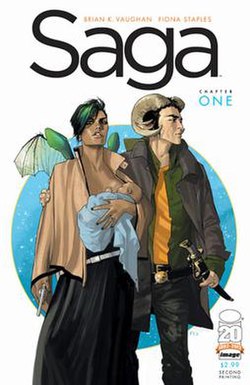 |
| Last week, Image publisher made waves by endorsing the comics he publishes! SHOCK! |
So the biggest comics news in the last week was Image publisher Eric Stevenson supposedly “pwning” Marvel and DC
comics.
I know, I know, a two syllable word should at least have two
vowels, but that’s not the big part of this story. His words have been
supposedly hailed as indicative of what “everyone” thinks;
As an industry, we still cling to the shortsighted and mistaken notion
that presenting ourselves to the world as Marvel and DC, as superhero movies,
is the key to reaching a wider audience, and it’s just not....
...The Walking Dead and Saga... have brought a lot of new
readers into your stores.
It is not
a coincidence that both of those books are published by Image....
New creativity is the future of this industry, not the latest Spider-Man #1.
[New
readers] want the real thing.
Transformers comics
will never be the real thing.
GI Joe comics
will never be the real thing.
Star Wars comics
will never be the real thing.
Okay, so if you didn’t get all of that, basically,
Image are the only ones who matter. In his speech, he managed to slam DC,
Marvel, Valiant, Dark Horse, IDW and pretty much everything not Image. I could
go on for days about how suspicious I find it that the only major publishing
house not criticised is Image, but that’s not the point of this article.
I appreciate the need
for books like Saga, The Walking Dead,
and Burn the Orphanage. I loved
reading the first issue of Lazarus and
am keen to get the TPB in the near future. But to dismiss Spider-Man, Batman, Star Wars or Transformers purely on the basis of them being around for longer
than Saga, is, in my mind, just as
shortsighted and mistaken as thinking that Superman
comics will destroy the industry.
 |
| Currently, there is nothing on the market that is the equivalent of this. |
“Not the real thing” quickly becomes “the
real thing”
Stevenson believes
that the reason comics based on Transformers
or Buffy sell so well is because
people what more of the thing they love. That’s a fair comment. But who’s to
say that it therefore can never be the real thing?
Take a quick look at the state of the “real thing” today:
the Star Wars prequel trilogy was
rubbish, GI Joe had horrible movies
and was not able to keep a series going, The
Transformers has been rebooted so many times that it now resembles its 80s
counterpart in name only (I mean, seriously, Optimus Prime has a mouth- that’s
how kids see Optimus Prime! As having a stinkin’ MOUTH), and Buffy hasn’t seen a screen for at least
a decade now. These books haven’t become a replacement for the real thing, they’ve
BECOME the real thing.
For example, I treat IDW’s Transformers as being more authoritative than Transformers Prime on the Hub. That’s because, as much as Transformers Prime is one of the better
series of the franchise to come out in the last decade-or-so, it’s a totally
different creature. IDW’s take, however, more closely represents the characters
as they were originally portrayed, and I therefore identify with it. To me, it’s
become the real thing- more real than Michael Bay’s films, more real than that
awful anime version, more real even than the 80s cartoon.
I imagine that the same can be said for Buffy. The same can be said for GI
Joe. The same can be said for Star
Wars. The same can be said for Teenage
Mutant Ninja Turtles. These stories become personal canon for their
readers. Dismissing it as “not the real thing” ignores the very personal
connection one makes to a story while reading.
Superhero books are just
as necessary to the industry.
 |
| I'd better not add this picture, or people will get the mistaken impression that comics have great characters that have inspired and helped to shape western society for almost a century! |
I’ll admit; one of the biggest challenges I run into on this
blog is finding a way to include other books amongst the deluge of DC and
Marvel titles. I’ll also admit, it is a mistake to think of comics only as
these two companies, or that comics are just superhero books.
But they still have a significant readership. If that
readership gets ignored then the comics industry loses a significant portion of
their market. It’s not a victory if you gain all of these new readers if we
lose an equal amount of old readers by alienating them.
Beyond that, though, Superhero comics play an important role
in the medium. Most of Image’s creators got their start working on superhero
titles with the “big two” (Eric Stevenson HATES that phrase, by the way). It
wasn’t Saga or The Walking Dead that got me into comics. It was Nightwing and Scarlet
Spider. These are fairly recent comics and they’re ones that I just found
more appealing than something I had no idea about- like Saga and The Walking Dead.
But the value of superhero books has more to it than just the fact that I
started reading comics thanks to them. Superhero books also create the image of
the ideal human spirit. They show optimism in the face of trial give messages
of hope to its readers- that’s something people need.
For the record, yes, I know people can in theory get that
from other books as well, but why ignore a genre that inspires hope purely on
the grounds that other genres do it too?
 |
| Out now! Pretend you're better than other comic book readers because you don't read superhero/nostalgia books! |
There are still good
stories to be found in these books.
The fact is, when stripped down to its bones, all of these
books are simply good stories being told. That’s the message that needs to be
sent out if we want to bring in new readers. Let them know that there is depth
to be found in lots of comics, whether that’s Saga or Superior Spider-Man.
Let them know that the comic industry is as mature as the novel industry, and even
more mature than the film industry (I feel more grown up reading a copy of All-New X-Men than I ever have watching
a Fast and Furious movie). That’s
what will bring in new readers; not wrapping up the same bones in different
skin.
Overall though, any storytelling excluding porn and Nazi propaganda
is generally worth reading. As I’ve said before, good narratives invite us to
consider deep themes and questions. Can Saga
and The Walking Dead do that? Of course,
but so can Justice League and The Avengers.

No comments:
Post a Comment